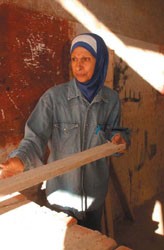
When Nariman Hefawi’s husband became too ill to manage his construction supply company, she took over to provide for their family. It was a daunting challenge. Hefawi is a woman in a male-dominated industry, and in dire need of capital to reactivate the business, which had closed during her husband’s illness. She knew she had the intelligence and determination to overcome social challenges – but she also knew that a large bank loan would be too big a burden.
She heard about Microfund for Women (MFW) when loan officers made a visit to her neighborhood. They were offering small loans to enterprising women, and Hefawi saw her opportunity. MFW is one of four sustainable institutions in Jordan that provides unsubsidized loans at affordable interest rates to borrowers who do not have collateral or a formal credit history.
USAID began working with MFW in 1998 as part of a program to establish a vibrant, sustainable microfinance industry in Jordan to boost economic growth. USAID helped MFW develop its business plan, operational strategies, and a management information system to better serve clients and achieve financial sustainability.
USAID began working with MFW in 1998 as part of a program to establish a vibrant, sustainable microfinance industry in Jordan to boost economic growth. USAID helped MFW develop its business plan, operational strategies, and a management information system to better serve clients and achieve financial sustainability.
USAID also supported other initiatives to enhance the industry as a whole, such as developing a regional training program for microfinance practitioners, and creating a wholesale funding facility. The facility acts as a temporary fund providing cash collateral that institutions like MFW can use to guarantee loans from commercial banks until they are able to secure loans based on their own credit history. Hefawi received her first loan from MFW in April 2002. To date, she has received four loans totaling approximately $4,000.
With the help of microfinance loans, and by maintaining an orderly warehouse, developing sound contracts, and following up on work orders, Hefawi has doubled the company’s inventory in less than two years, allowing her to serve a broader client base. She is now well respected in the local construction industry. In recognition of her hard work and integrity, Hefawi was named Service Sector Microentrepreneur of the Year at the Fourth Annual Microentrepreneur Awards.







Comment
Make a general inquiry or suggest an improvement.